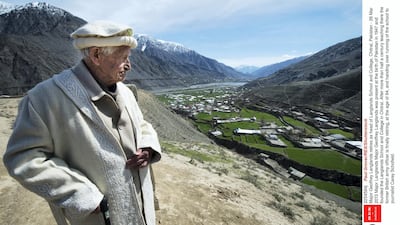Major Geoffrey Langlands arrived in India as part of the British effort to ensure its orderly partition in 1947. He never left.
His subsequent career as teacher followed the twists and turns of the new country of Pakistan where he was once kidnapped by militiamen and where he educated generations of political leaders, as well as taking tea with the country’s various military dictators.
When his death was announced on Wednesday at the age of 101, politicians, diplomats and business giants were among those who paid tribute.
“Born on October 21, 1917 and affectionately known to all as ‘The Major’, we acknowledge the life of a soldier, teacher, gentleman, story-teller, mountaineer and humanitarian whose life was devoted in service to others and especially his adopted country Pakistan,” said a statement released by Lahore’s Aitchison College, where Langlands once worked and later lived out his belated retirement.
Imran Khan, Pakistan’s prime minister, is among Langlands’ former pupils. And the teacher was on speaking terms with all the country’s recent leaders, including Pervez Musharraf, Benazir Bhutto and Nawaz Sharif - each tapped for donations to the schools he ran.
Haroun Rashid, a retired businessman who was a pupil at Aitchison from 1958 to 1969, remembered being taken on a 250-mile trek at the age of 13 that included crossing a mountain pass at an altitude of 16,500-ft.
“Those experiences live with you for ever,” he said. “His entire life was dedicated to educating children in the widest possible sense, not just in the classroom.”
He is leading calls for a state funeral to honour a beloved figure who became something of a national treasure.
Langlands arrived after serving with 4 Commando during the Second World War. He volunteered to join the British Indian army and stayed on after the upheaval of partition to act as an adviser to the new Pakistani Army.
General Ayub Khan, the then military chief (and later the country’s first military dictator), helped win him a job teaching mathematics at the prestigious Aitchison College, where the British had taught the sons of Indian royalty.
He won many admirers for his Mr Chips-style approach to instilling what Pakistanis believed to be British values of duty and punctuality in his young charges. He became known as much for always-shined shoes and pressed blazer as his personal motto of “do good and be good”.
So in the late 1970s when the education authorities needed someone to take over a new school in North Waziristan, deep in the restive tribal belt, they turned to Langlands.
“There were not any Pakistani teachers of note willing to take on that job,” said Mr Rashid.
The job came with unique challenges. On one occasion he was kidnapped by militiamen who wanted to overturn a disputed election result. They believed that General Zia ul-Haq, the president, would intervene if he knew the famous “Britisher” had been taken.
In the end he was released after six days and the result stood, an experience Langlands later shrugged off as informative rather than traumatic.
“It was all part of the experience,” he once said.
In 1988 he moved to Chitral, in the mountainous, northern areas of Pakistan, taking over what eventually became known as Langlands School and College.
He stayed for more than 20 years, taking the modest salary of £40 a week, and rising before dawn each day to breakfast on a bowl of Quaker Oats porridge followed by poached eggs – the secret to his long and active life, he said.
He was 94 when he finally stepped down, a process that was delayed by the stop-start search for a successor. Friends said Langlands could not bear to give up his life at a school that had become renowned for impressive grades, but he insisted prospective principals were worried about insecurity in an area hemmed in by Afghanistan on one side and by the Swat Valley, which was overrun by the Taliban in 2009, on the other.
“One of them actually wrote in his final letter that he thought Pakistan was supposed to be getting better and better but found out it was getting worse and worse,” he said in a 2012 interview.
“But that is what has kept me here, the idea of getting my little bit better and better.”
That loyalty to Pakistan made him a popular figure in a country that has struggled with terrorism, international sanctions and the rise of its regional rival India.
Langlands death was met by an outpouring of affection on social media.
“Major Langlands left us today after completion of his mission to enlighten Chitral with the light of knowledge,” wrote Ajmal Chitrali on Twitter. “His life gives us the lessons of patience, sacrifice and dedication.”
Thomas Drew, the British high commissioner to Islamabad, said: “Pakistan has lost a great friend and teacher of generations of its students.”

